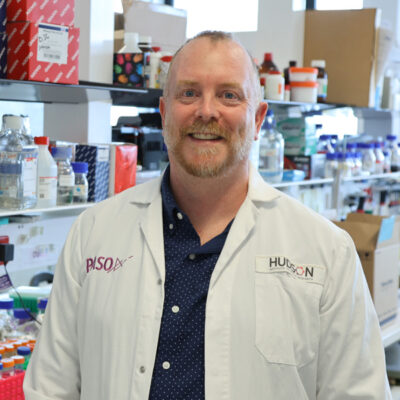Double blow for lung cancer and emphysema offers hope to patients
By Hudson Institute communications. Reviewed by Professor Brendan Jenkins
Lung cancer and emphysema could be diagnosed earlier and targeted with an existing drug, vastly improving patient outcomes, researchers at Hudson Institute of Medical Research have discovered

Lung cancer and emphysema could be diagnosed earlier and targeted with an existing drug, vastly improving patient outcomes, researchers at Hudson Institute of Medical Research have discovered.
A team led by Professor Brendan Jenkins discovered that the drug, sgp130Fc, has the ability to halt the progression of lung cancer and emphysema. Combined these lung diseases claim the lives of 15,000 Australians each year.
The team also identified a unique signature that could be used to detect both diseases much earlier through a simple blood test. Both diseases are difficult to detect early, for instance currently emphysema can only be diagnosed in later stages by a CT scan, which means many patients present late when treatment options are limited.
“Early detection is crucial to effective management and treatment of both diseases. A blood test has the potential to vastly improve survival rates through earlier diagnosis while sgp130Fc has the ability to halt the progression of lung cancer and emphysema,” said Professor Jenkins.

The study on emphysema, a culmination of six years’ work for the team, including first author and NHMRC Biomedical Fellow, Dr Saleela Ruwanpura, has been published in the prestigious American Journal of Respiratory and Critical Care Medicine.
It follows on from a related study on lung cancer published by the team, including first author and PhD student, Gavin Brooks,earlier this year in the top-ranked Cancer Research journal.
Stopping deadly disease in its tracks
In both studies, the team identified that an inflammation causing molecule, Interleukin 6 (IL-6), propels both emphysema and lung cancer through a process called trans-signalling.
“Trans-signalling and IL-6 are having very important effects on lung disease – they are master regulators and can both be targeted with sgp130Fc,” Professor Jenkins said.
“We were surprised to discover that lung cancer and emphysema are so closely linked when they are such different diseases. Emphysema is characterised by the loss of lung tissue and lung cancer by uncontrolled growth of tissue.”
The Hudson team found that receptors which are essential for the IL-6 ‘trans-signalling’ process are present in high levels in the blood of both emphysema and lung cancer patients.
-
- Lung cancer is the most common cancer in the world, and the leading cause of cancer death in Australia.
- Emphysema is the major debilitating component of the lethal chronic obstructive pulmonary disease (COPD), which is predicted by the World Health Organisation to be the third leading cause of death worldwide by 2020, behind heart disease and cancer.
- Together, lung cancer and emphysema claim around 15,000 lives in Australia each year.
- Patients with emphysema are at an increased risk (between 25 and 30 per cent) of also developing lung cancer.
An inflammation-focused drug, repurposed
The drug sgp130Fc was developed by Professor Jenkins’ German collaborator, Professor Stefan Rose- John from the University of Kiel, to specifically target the process of trans-signalling.
The drug is currently in clinical trials for other diseases which use the mechanism of trans-signalling, including inflammatory bowel disease. The team now believes the drug has clinical potential in lung cancer and emphysema.
Next steps

Hudson Institute collaborators on the lung carcinogenesis study include: Mr Gavin D. Brooks, Ms Louise McLeod, Mr Sultan Alhayyani, Dr Alistair Miller and Dr Saleela Ruwanpura.
The team that worked on the emphysema study included: Dr Saleela M Ruwanpura, Ms Louise McLeod, Mr Sultan Alhayyani, Dr Michelle D Tate, Dr Virginie Deswaerte, Mr Gavin D Brooks, Dr Martin MacDonald, Dr Paul T King and Professor Philip G Bardin.
Professor Jenkins’ team is now working with clinical colleagues at Monash Health, led by Professor Philip Bardin, to analyse the blood samples of lung cancer and emphysema patients in the hope of developing an early detection blood test for both diseases.
“By matching blood results to the severity of the disease, we will look to confirm whether a blood test is an effective earlier test for emphysema and lung cancer,” said Professor Bardin.
Professor Jenkins is cautiously optimistic about the drug’s potential. Armed with both findings, his team will now also investigate the potential uses for sgp130Fc in the management of lung cancer and emphysema.
“Not every patient with emphysema or lung cancer is a candidate for this drug, but with clinical trials we can identify which patients would respond to treatment and at which stage of the disease. We believe there’s a real opportunity here to target and treat patients with these lung diseases.”
Donations are urgently needed to support this important research. Make a tax deductible donation here.
Journal | American Journal of Respiratory and Critical Care Medicine
Title | Therapeutic Targeting of the IL-6 Trans-Signaling/Mechanistic Target of Rapamycin Complex 1 Axis in Pulmonary Emphysema
View publication | https://doi.org/10.1164/rccm.201512-2368OC
Journal | Cancer Research
Title | IL6 Trans-signaling Promotes KRAS-Driven Lung Carcinogenesis
View publication | https://doi.org/10.1158/0008-5472.CAN-15-2388
In this article
About Hudson Institute
Hudson Institute’ s research programs deliver in three areas of medical need – inflammation, cancer, women’s and newborn health. More
Hudson News
Get the inside view on discoveries and patient stories
“Thank you Hudson Institute researchers. Your work brings such hope to all women with ovarian cancer knowing that potentially women in the future won't have to go through what we have!”





